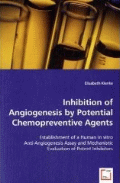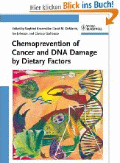|
|
|
|
Information about this site:
|
|
|
The author- or copyrights of
the listed Internet pages are held by
the respective authors or site
operators, who are also responsible for
the content of the presentations.
|
|
|
To include your website to the
Internetchemistry directory, please use
our
registration form or
send us an
eMail. |
Citation: |
www.internetchemistry.com/chemistry/chemoprevention.htm |
Entries: |
11 |
Topic: |
Chemoprevention and Chemopreventive Compounds |
Keywords: |
Chemoprevention, chemopreventive compounds, agents |
Update: |
10.03.2012 00:00:00 [link check] |
|
10.03.2012 [site update] |
Chemistry information
not found? Try this form: |
|
|
|
Related Books and Scientific Literature: Chemoprevention:
|
|

|
Elisabeth Klenke
Inhibition of Angiogenesis by Potential Chemopreventive Agents
A new human in vitro anti-angiogenesis assay was established and applied to identify novel angiopreventive agents. Subsequently, two chemopreventive compounds, xanthohumol (XN) from Humulus lupulus L. (hop) and sulforaphane (SFN), an isothiocyanate derived from cruciferous vegetables (Brassicaceae), were selected for detailed investigation of their angiopreventive potential and mechanisms involved in the inhibition of angiogenesis. Representative targets included effects at the transcriptional levels of pro-angiogenic factors, anti-gelatinolytic and anti-endothelial activity. In vivo, XN was shown to exhibit a strong anti-tumour potency on human breast cancer xenografts mediated by the inhibition of tumour-induced angiogenesis. These findings strongly suggest that XN and SFN represent attractive chemopreventive lead structures possessing a remarkable potential to prevent tumour development.
VDM Verlag Dr. Mueller e.K.; 2008
|
|

|
Siegfried Knasmüller, David M. DeMarini, Ian Johnson, Clarissa Gerhäuser
Chemoprevention of Cancer and DNA Damage by Dietary Factors
This work offers the latest up-date on naturally occurring cancer inhibitors in the diet! Cancer prevention is defined by active measures to reduce the incidence of cancer. Preventive dietary factors are acting by a variety of mechanisms - as for example modifying cancer causing factors or altering their metabolism. Based on epidemiological studies there is emerging evidence, that certain factors have a direct impact on cancer risk. Research within cancer chemoprevention is of growing interest for medics, pharmacists as well as biologists. This book covers comprehensively all important aspects of cancer chemoprevention. Chapters deal with different molecular mechanisms of cancer prevention by dietary factors, and a variety of experimental approaches to study its preventive functions in vitro and in vivo, as well as currently known defined substances function.
Wiley-VCH; 2009
|
Internetchemistry ChemLin © 1996 - 2013 A. J.
|



